Chinese tech giants Baidu, Alibaba, and Tencent are rapidly improving their artificial intelligence, challenging current U.S. tech leaders like Google and Amazon, Fortune’s Jonathan Vanian writes:
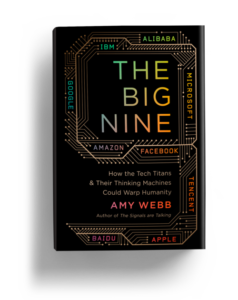 China’s so-called BAT companies, as New York University business professor and futurist Amy Webb calls them in her latest book, The Big Nine, get a big boost from their government’s funding and tech-friendly policies. Government support has helped embed the BAT companies’ technologies across China, in everything from mobile messaging and e-commerce, to digital payments and health care.
China’s so-called BAT companies, as New York University business professor and futurist Amy Webb calls them in her latest book, The Big Nine, get a big boost from their government’s funding and tech-friendly policies. Government support has helped embed the BAT companies’ technologies across China, in everything from mobile messaging and e-commerce, to digital payments and health care.
“I think democracy is at stake—I’m not joking,” Webb says. “I think our way of living is at stake and the future of how we do business globally is at stake.”
Cybersecurity toolkits ahead for elections and media
The founder of Craigslist and the Global Cyber Alliance are teaming up to provide free cyber defense toolkits to election officials, nonprofit election rights groups and the media modeled after the ones GCA recently pioneered for small businesses, POLITICO’s Morning Cybersecurity reports:
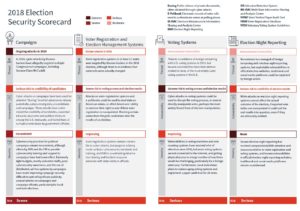 Craig Newmark Philanthropies is offering GCA more than $1 million for the project, and GCA is netting $1.5 million from other sources, the groups are announcing today…“Elections bodies and the media are facing increasingly sophisticated cyberattacks that can impair the exercise of democracy and affect election results, and they are not prepared to deal with the threat,” Phil Reitinger, president and CEO of the GCA, told MC…..Reitinger said the election-related toolkits are closer to completion than the ones for media after working with the Center for Internet Security and Elections Infrastructure Information Sharing and Analysis Center.
Craig Newmark Philanthropies is offering GCA more than $1 million for the project, and GCA is netting $1.5 million from other sources, the groups are announcing today…“Elections bodies and the media are facing increasingly sophisticated cyberattacks that can impair the exercise of democracy and affect election results, and they are not prepared to deal with the threat,” Phil Reitinger, president and CEO of the GCA, told MC…..Reitinger said the election-related toolkits are closer to completion than the ones for media after working with the Center for Internet Security and Elections Infrastructure Information Sharing and Analysis Center.
Spanish Prime Minister Pedro Sánchez on Tuesday called on all political forces in the country to back a new national cybersecurity fight against “attempts to hack democracy and undermine citizens’ trust in the political system,” AP reports:
Spain’s April 28 general election is seen as a testing ground for new measures that the European Union is adopting to shield elections to the European Parliament a month later. The Europe-wide efforts include a “rapid alert system” linking specialized coordination units in all EU member states and require internet companies to share regular updates on their efforts to eradicate disinformation campaigns.
Social media abuses threaten Asia’s democratic elections, the Nikkei Asian Review adds. Various technology “fixes,” alone, may not be enough to prevent the corrosive effects, experts suggest, citing the impact of China-style digital authoritarianism.
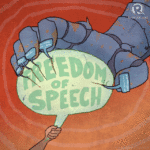
rappler
Filipina journalist Maria Ressa says journalists need to “hold the line” as democracy is under threat throughout the world, PRI reports.
The Philippines and her news organization, Rappler, are the “canaries in the coal mine” she said in a keynote speech on the role of journalists when social media has fueled the spread of disinformation. Ressa, one of the “Guardians” that Time Magazine named as its 2018 person of the year, is facing 11 different charges from the Philippine government ranging from tax evasion to libel.
 Iran’s Islamic Revolutionary Guard Corps (IRGC) secured its dominance not by cultivating the support of Iran’s people, but through force, corruption, and disinformation campaigns, analyst Saeed Ghasseminejad writes in “The Revolutionary Guard’s Disinformation Campaign to Dominate Iran’s Economy,” a report for the Foundation for Defense of Democracies’ Iran Disinformation Project:
Iran’s Islamic Revolutionary Guard Corps (IRGC) secured its dominance not by cultivating the support of Iran’s people, but through force, corruption, and disinformation campaigns, analyst Saeed Ghasseminejad writes in “The Revolutionary Guard’s Disinformation Campaign to Dominate Iran’s Economy,” a report for the Foundation for Defense of Democracies’ Iran Disinformation Project:
The IRGC not only lies about the dimensions of its presence and influence, taking great pains to hide behind an enormous network of front companies, but also works to eliminate competitors from the field with disinformation, slander, and trumped-up litigation. The presence of the Guard – a military-intelligence organization with prisons at its disposal and great influence in the judicial system – in Iran’s economic life is one factor contributing to the regime’s corruption and inefficiency.
 Connectivity is the new geopolitics, according to Global Trends to 2030: Challenges and Choices for Europe, a report from the European Strategy and Policy Analysis System.
Connectivity is the new geopolitics, according to Global Trends to 2030: Challenges and Choices for Europe, a report from the European Strategy and Policy Analysis System.
“The current situation must not be misread merely as an attack on democracy: it is also an opportunity to adapt our systems to the new political environment we now live in,” the report states:
The new environment is as much about new connectivity and information flows as it is about populism…..Indeed, one of the many drivers of populism is perceived government unresponsiveness rather than the desire to install authoritarian regimes. It is this frustration that outsiders can tap into and feed in disinformation to destabilise our systems.
“Technology will be a determining factor in how Europe positions itself in the world as a setter of ethical standards when it comes to preventing the use of machines for warfare, totalitarian control, and disinformation,” the authors add.
 If, in 2005, there were around one billion Internet users worldwide, today that number stands at almost four billion and rising, the report notes:
If, in 2005, there were around one billion Internet users worldwide, today that number stands at almost four billion and rising, the report notes:
- At the same time, the number of connected devices is increasing exponentially, powered by the fast-growing Internet of Things and the Fourth Industrial Revolution. Indeed, ‘connectivity’ is becoming a forceful expression of political power and global ambition, far surpassing mere economics.
- Some technologies will allow for tighter controls within totalitarian societies, undermining Europe’s democratic ideal
- Unregulated advances in modern technology have unintended consequences. For instance, the use of robotics in warfare leads to indiscriminate killing; the unchecked evolution of superintelligence replaces human intelligence; big data is abused to undermine democracies and even free will.
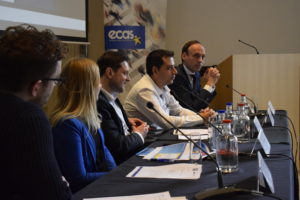 “Emotions in communication will become more and more important as the distance between citizens and decision-makers shrinks,” the report adds. “Connectivity means that individuals can identify with global policy issues beyond their borders, creating clusters of online citizenship.”
“Emotions in communication will become more and more important as the distance between citizens and decision-makers shrinks,” the report adds. “Connectivity means that individuals can identify with global policy issues beyond their borders, creating clusters of online citizenship.”
Conflicts in Europe’s neighbourhood have already impacted in several ways, with at least two consequences:
- First, how do we ready ourselves for both potential physical and online attacks? Do we have the necessary procedures, equipment, and imagination to pre-empt and deter all forms of attack, ranging from ‘classical’ kinetic wars to political agitation, disinformation and infiltration?
- Second, conflicts elsewhere need to be prevented, solved and their aftermath stabilised more efficiently….
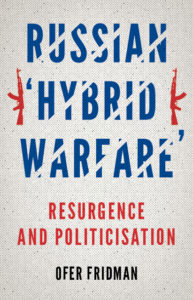 As Ofer Fridman points out in his book “Russian ‘Hybrid Warfare’: Resurgence and Politicization,” the concepts behind Russia’s digital attacks are not new, analyst Brian Klaas wrote for Democracy Post. They trace their origins to long-forgotten Russian military theorists, such as Evgeny Messner, who understood that conventional military operations had limitations that could be overcome if complemented by unconventional tactics that don’t involve bullets or bombs.
As Ofer Fridman points out in his book “Russian ‘Hybrid Warfare’: Resurgence and Politicization,” the concepts behind Russia’s digital attacks are not new, analyst Brian Klaas wrote for Democracy Post. They trace their origins to long-forgotten Russian military theorists, such as Evgeny Messner, who understood that conventional military operations had limitations that could be overcome if complemented by unconventional tactics that don’t involve bullets or bombs.
On the other hand, technology can also enhance as well as disrupt democratic practices.
Digital tools are changing democracy as we know it, bringing along new opportunities, advances and challenges, a recent report suggests. Online platforms and e-voting practices have given access to the political world where it was lacking before, allowing citizens to be better informed and involved, says the European Citizens Action Service (ECAS – above).
Who says digital technologies are democratizing?
The above session hears from technologists, scholars and activists on the ways in which technology is used by community-builders to advance democracy and citizen agency, and the ways in which those same technologies are used by autocrats to surveil and silence political opponents. Speakers: Kevin Bankston, Director, Open Technology Institute, New America; Stephen King, CEO, Luminate; Sandor Léderer, Co-founder and Director, K-Monitor; Sean McDonald, Co-founder, Digital Public and CEO, FrontlineSMS; Yeshimabeit Milner, Founder and Executive Director, Data for Black Lives
In conversation with Lucy Bernholz, Senior Research Scholar, Stanford University Program on Philanthropy & Civil Society.







